Scott Adams occupies an odd position in interactive fiction in that he tends to get more love from those outside the active modern community than from those within it. Every year brings one or two fawning interviews with the always obliging Mr. Adams on mainstream or retro-gaming sites. Within the IF community, however, Adams’s works are usually mentioned, if at all, only as historical curiosities, and certainly aren’t accorded even a sliver of the respect given to the Infocom canon, outside of a handful of reactionary voices who declare this lack of respect for Adams’s simplistic but fun games to be symptomatic of the general literary pretensions of the community as a whole that have made the modern text adventure a No Fun Allowed zone. (For a classic and entertaining rant in this vein, see the discussion page of the Adventureland Wikipedia entry.) Further confusing the issue is an unfortunate if blessedly only occasional tendency toward self-aggrandizement on Adams’s own part, such as the FAQ entry on his home page that states he is “credited [by whom?] with starting the entire multi billion dollar a year computer game industry.” “Helping to start” I would be fine with, but as it stands… really, Scott? You singlehandedly started the computer-game industry?
Still, Adams does deserve more credit and respect than he generally receives within community circles for bringing text adventures into homes for the first time and, not incidentally, showing that one could make a pretty good living from the things. His creation of a playable adventure game on a TRS-80 with just 16 K of RAM and a cassette drive was conceptually audacious and technically impressive, and that he did it in the slow, inefficient TRS-80 BASIC just made it even more remarkable. Adams’s greatest failing in the long run was perhaps his inability to make the transition from treasure-hunting text adventures to the more sophisticated storytelling of Infocom’s interactive fiction, as evidenced by his seeming disinterest in improving the core technology of his games beyond gilding these simplistic lillies with graphics and colors. But that’s material for later posts. Today I want to talk about Adams’s initial masterstroke, Adventureland.
Born in 1952, Adams already had extensive professional experience with computers before he created Adventureland in 1978, having majored in the field at the Florida Institute of Technology, worked with computers during a stint in the Navy, and found employment thereafter with Stromberg-Carlson, an early manufacturer of telephone PBX equipment, as a programmer. Adams had also been building and experimenting with microcomputers in his home since 1975, when he built a Sphere 1 from a kit. Beginning with a tic-tac-toe game which “could never lose,” his main activity with these machines had been writing and playing games. Like so many other hackers, he was entranced when Adventure turned up on the computer at his workplace, and, also like so many others, after completing it at last he turned his attention to writing his own. But unlike the others, who did their work on big institutional computers, Adams chose the little TRS-80 as his target platform.
Adams did not set out with grand ideas about bringing interactive narrative to the masses. In standard hacker fashion, he was drawn to the project as an interesting technical challenge in light of the constraints of the TRS-80, and as a chance to work extensively with text, something he hadn’t done previously. As an experienced programmer, Adams shared most hackers’ preference for creating robust, reusable systems and tools in lieu of one-off programs, and so began working not so much on an adventure game as on a reusable adventure implementation system. He thus divided the project into three parts: a database editor of sorts to let him input the data that would make up the virtual world of each game, an interpreter to read in that data and let the player interact with it, and finally the data that made up the game itself.
It’s a remarkable system, but it also should be understood that Adams did not create a full-fledged virtual machine in the sense of Infocom’s later Z-Machine. While the interpreter does indeed read in the details of rooms, objects, etc., much functionality is hard-coded into the BASIC interpreter. The engine, for instance, assumes that gameplay will revolve around gathering a collection of objects (treasures) and dropping them back in a certain location. Any but the most basic modifications to the Adventureland game will also require modifying the code of the interpreter, if only because the name of the game itself and instructions for play are hard-coded there.
It’s really a hybrid system, surprisingly similar in its construction to Adventure itself, which also divided its functionality between the program code and a data file.
In fact, having just played through the original Adventureland I’m struck by how many similarities it bears to its predecessor. Like Adventure, Adventureland is a plot-less treasure hunt that begins above-ground in a forest.
Adventureland‘s wilderness area is actually larger and more interesting than Adventure‘s, containing a number of puzzles in its own right beyond the obvious one of finding one’s way underground. Its underground complex is, however, vastly smaller, as one would expect given the constraints Adams was working under. This is not entirely to the game’s disadvantage, as Adams’s inability to indulge himself with dozens of empty locations keeps things much more tightly focused and manageable for the player; the obligatory maze, for example, consists of a modest six rooms, a marked and welcome contrast to Adventure‘s monstrosities.
Which is not to say that Adventureland is exactly playable, at least by modern standards. The above-ground areas are filled with the usual non-reversable room connections that make mapping and navigation a non-intuitive pain, redeemed (once again) only by the fact that there are so few locations in all. The logistics of light sources and inventory management are once again a big part of the challenge, and there are heaps of ways to screw up and make the game unwinnable, many unhinted at before they happen. To understand the full cruelty of this, you have to put yourself in the shoes of someone playing the game on an actual TRS-80, where it is only possible to restore a saved position by restarting the game entirely from cassette, a process that takes about 25 minutes. Saving a game, meanwhile, takes over 4 minutes. No wonder Adams could advertise that Adventureland would take weeks or months to complete! What he didn’t mention was that in addition to a TRS-80 it would require the patience of Job…
I notice the same dichotomy in Adventureland‘s puzzles that I wrote about with respect to Adventure‘s: most are either very straightforward and commonsensical or unfair to the point of absurdity, with only a few occupying a satisfying middle ground. Also like Adventure, Adventureland is surprisingly progressive in some ways, managing to shoehorn a fair number of hints into its 16 K, but also leaves some of its worst offending puzzles totally unclued. An example is the bear puzzle (a character whose presence is yet another echo of Adventure). He is blocking your way, and can be moved only by the completely unmotivated action of YELLing. Later versions did allow the player to SCREAM at the bear (see Grunion Guy’s review for an hilarious anecdote related to that), but in this original version it was YELLing or nothing.
To make this puzzle even worse, the bear is described as “looking hungry.” This naturally leads the player to want to feed him the honey which she can find elsewhere in the game, which in fact works — except that said honey is also a treasure (?!) she needs to collect to finish the game. Not only is all this supremely cruel, but, just to make it all worse, the false solution actually makes for a much fairer and more satisfying puzzle than the correct one.
Granted, Adventureland‘s extremely primitive parser and world model do once again perhaps make it difficult to build really challenging puzzles that don’t spill over into unfairness. Its implementation of the THROW verb is quite interesting, as it already shows Adams struggling with the limitations of his two-word parser.
It’s not really fair to judge Adventureland‘s text by literary standards, since every “the” and “a” use precious memory (and thus were often dropped entirely). Still, Adams does at times achieve a sort of minimalist poetry.
He does have some issues with spelling…
…but there’s a sort of goofy charm about the whole experience…
…which finally comes down to this.
And that’s about all there is to say about it, really. There are no advances over the treasure-hunt template laid down by Adventure, but Adventureland is an impressive achievement merely for existing, and even today is still kind of fun in its simple way.
If you’d like to play it for yourself, there are plenty of ways to do so, the most accessible of which is a browser-based version at iFiction. Scott Adams himself hosts downloadable versions on his website. Or, if you want the most authentic experience possible, I have a MESS TRS-80 saved state that will let you play the original BASIC version on its original (virtual) hardware. (See my notes on MESS TRS-80 emulation to get started.)
Next time I’ll talk about Adventureland‘s marketing and reception and the TRS-80 adventure-game craze it started.
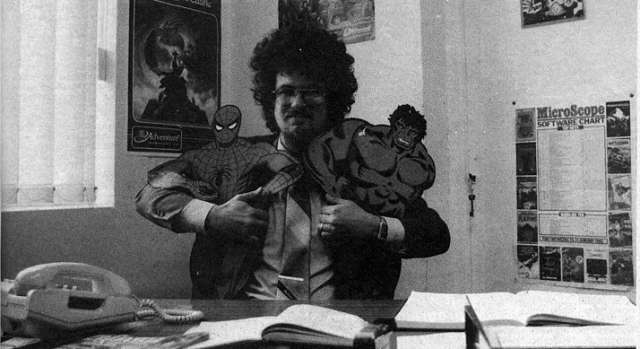


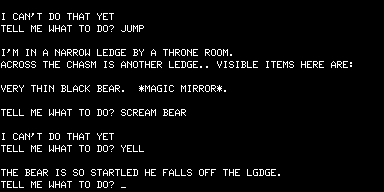

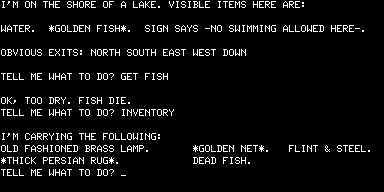

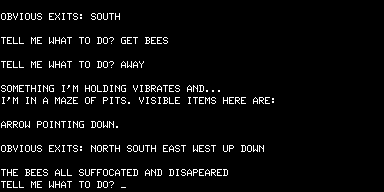

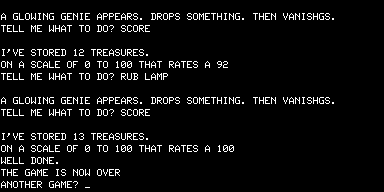


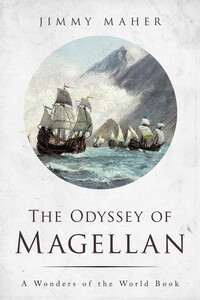








Felix Pleșoianu
June 23, 2011 at 7:04 am
In all honesty, the IF community’s hatred of two-word parsers, not to mention one-word (a.k.a. CYOA), is ridiculous. The latter, at least, is a proven form by now. Can it go horribly wrong? Sure. But so can a fully blown Infocom-style adventure.
I’m sure you’ve heard these arguments before, but: 1) knowing commands are at most two words can be a big counter to the “guess the phrasing” syndrome. 2) Even with a serious parser, sometimes you need disambiguation. Why is it suddenly a problem if a Scott Adams adventure needs it?
As for Scott Adams’ games never evolving past the treasure hunt stage, well, those are a valid subgenre of text adventures. Some people like them. Who are we to slap them down? IF doesn’t have to be all high-brow literary stuff any more than paper books do.
Jimmy Maher
June 23, 2011 at 8:01 am
“In all honesty, the IF community’s hatred of two-word parsers, not to mention one-word (a.k.a. CYOA), is ridiculous.”
I don’t really see this hatred you speak of. Emily Short has written in depth about Choice of Games’s CYOA adventures on a few occasions, and Jon Ingold has been writing CYOA fiction of his own recently, just to point out two examples of decided non-hatred from community luminaries. Then there’s all the work Aaron Reed and others have done to try to simplify the parser. I think there is widespread acknowledgment that something kind of precious gets lost when we go to a pure CYOA or keyword system, but also recognition that the traditional Infocom-style parser has issues of its own. I see debate, criticism… but no hatred, at least among the people whose work and ideas I most respect.
“Even with a serious parser, sometimes you need disambiguation. Why is it suddenly a problem if a Scott Adams adventure needs it?”
I actually didn’t mean it as (negative) criticism at all. I pointed it out because I thought it was an interesting solution to the restrictions a 2-word parser brings, and interesting that even at this early date Adams felt the need to implement such a thing. If anything, I found it kind of impressive.
“As for Scott Adams’ games never evolving past the treasure hunt stage, well, those are a valid subgenre of text adventures. Some people like them. Who are we to slap them down?”
Well, I certainly never intended to slap anyone down. :) You’re right, of course, that they’re a valid genre and that some people like them. Hell, I like them… I had fun with Adventureland. More fun than I expected to have, actually.
However, for an art form to stay vital there have to be people willing to push the boundaries and experiment with new approaches. Based on my memories of Scott Adams’s work, I don’t sense a lot of boundary-pushing there. (I’ll certainly be revisiting him a number of times in the near future, so that opinion could change.) Which doesn’t erase his very real achievements, of course, or mean there’s anything wrong with playing and enjoying his games.
Felix Pleșoianu
June 23, 2011 at 9:13 am
The attitude has been changing as of late. But as it was pointed out in a recent discussion (on ifMUD, was it?) CYOA always does poorly in the IFComp, and that’s a clear indication of what the community wants. And yes, Emily Short even entered the first LOTECH Comp… but she’ll also happily tell you that “it’s not interactive fiction unless it’s text in, text out”.
It would probably be more fair to say that the IF community’s attitude towards CYOA is a schizoid one. There are famous works by famous authors using a keyword-based interface, exclusively or not, but we can’t quite admit to ourselves that the mighty parser may not be the end-all-be-all of text-based interactive storytelling. Possibly because of all the effort that was sunk into perfecting the damn thing.
I have to agree. His games all look the same to me, and so are fan games using the same system. But adventures with minimal text and two-word parsers can do more than that — if only they’d be given a chance.
Oh, and it looks like I misunderstood your point about disambiguation. Sorry.
Jimmy Maher
June 23, 2011 at 10:10 am
“But as it was pointed out in a recent discussion (on ifMUD, was it?) CYOA always does poorly in the IFComp, and that’s a clear indication of what the community wants.”
I’d be very careful with this particular chain of logic. I played those CYOAs and rated them very poorly myself — not because they were CYOAs but just because they were very badly done. One was half in English and half in German, because the author “ran out of time to finish translating it,” for God’s sake! As a counterpoint, there was a game in the (I believe) 2009 Comp that understood only YES and NO, but did reasonably well in spite of that because it was genuinely witty and clever.
“…but we can’t quite admit to ourselves that the mighty parser may not be the end-all-be-all of text-based interactive storytelling.”
What we need is something with the ease of use of CYOA and the flexibility of the parser. I think there is more and more implicit recognition of that. We haven’t found it yet, but I don’t think the community is as wed to the traditional parser as you imply. Show them something that is clearly better, and I think many would be all over it. It’s just that pure CYOA isn’t that thing — it’s far too much of a straitjacket, at least for the sort of works many of us want to do.
matt w
June 23, 2011 at 3:56 pm
“there was a game in the (I believe) 2009 Comp that understood only YES and NO”
Someone didn’t find the winning ending.
Kevin Harris
June 21, 2015 at 12:17 am
The 2009 IFComp game is The Ascot.
matt w
June 23, 2011 at 3:43 pm
One-word parsers and CYOA aren’t the same thing. Andrew Plotkin’s “The Space Under the Window,” Jason Dyer’s “Renga in Four Parts,” and my demo “The Table” all have one-word parsers, but they aren’t CYOA by any reasonable definition, because they don’t tell you which words are acceptable. I wouldn’t even describe keyword-driven IFs like Walker and Silhouette or Blue Lacuna as CYOAs; “you can type in any of this fairly long list of words and it’ll do something” is a very different structure from “Choose one of these alternatives.” (Admittedly the only IF I can think of that disallows any input other than keywords is Juhana Leitonen’s Starborn, but I’d say the same thing about it.) And of course with most CYOAs, the alternatives you choose will be described in terms of more than one word.
I think it’s more accurate to say that CYOAs have no parser. This isn’t a criticism.
Jimmy Maher
June 23, 2011 at 4:15 pm
“One-word parsers and CYOA aren’t the same thing.”
Yes, absolutely. I was actually mentally connecting keyword parsers with two-word parsers rather than CYOAs, albeit tangentially, in response to Felix’s assertion that two-word parsers can theoretically make games easier in that they can remove some “guess the phrasing” issues. Not a perfect linkage, of course, but there you go. :)
Felix Pleșoianu
June 23, 2011 at 5:07 pm
As far as I can tell, Walker & Silhouette offers a fairly limited number of alternatives at any one point in time. More than your average CYOA, yes, but enough to turn quantitative accumulation into a qualitative jump? As for the fact that in CYOA alternatives are described in several words, surely you’ll agree that it’s merely a cosmetic difference?
matt w
June 23, 2011 at 11:32 pm
I would say that there’s a qualitative difference between the keywords in W&S and CYOA, if only because after a given text output you can very often go back and use a keyword from a previous output. In CYOA, if it’s not on your current page it’s not there. It’s true that in Undum there are choices that print something and still let you choose some of the alternatives that were open before, but I think Undum has to indicate which alternatives are still open, which W&S doesn’t — at least not the text version, which is the only one I’ve played.
Absolutely the several words vs. one word distinction is merely a cosmetic difference, but that’s part of why it’s inaccurate to describe CYOA as a one-word parser. It’s not that CYOA lets you enter one word and then processes it, it lets you pick from a menu of predefined choices, which are explicitly presented to you, which may be expressed in one or many words. Cases like Walker & Silhouette and Starborn are borderline, maybe, but the first three one-word games I mentioned are definitely not CYOA, because they do let you enter any word you want, and then they parse it (to the extent that any IF does — Space rejects words outside a certain list much as conventional IF rejects misunderstood verbs, though the other two games actually pretend to accept any input).
Jason Scott
June 25, 2011 at 12:32 am
Scott Adams Inc./Adventure International is the first game software company that would take work from other authors, and sold both in stores and via shipping to other stores. Doug Carston, who would go on to found Broderbund, is one of the first programmers for AI before splitting off to start that company. Ken Williams of Sierra Online/Online Systems gets his start as a salesman for Adventure International. Reading the Adventure International Catalog from 1983: http://www.archive.org/stream/1983-ai-catalog – you’ll see a bunch of other names that radically affect games being sold on home computers.
Jimmy Maher
September 18, 2012 at 5:18 pm
Having done a lot more research in the time since this article and comment originally appeared, I can now say that none of this is quite correct. For the historical record, and to keep anyone who comes along to this article from being misled:
1. Adventure International was not the “first game software company that would take work from other authors.” AI didn’t get going until very late 1979, by which time the TRS-80 Software Exchange, Creative Computing Software, Programma International, California Pacific, Personal Software, and various others were all actively soliciting and publishing games.
2. Doug Carlston was never a “programmer for AI.” He published his first games via non-exclusive agreements with the TRS-80 Software Exchange and Creative Computing Software, which allowed him to turn around and additionally offer them through the AI catalog after AI started up. AI was simply another organ of distribution for him.
3. Ken Williams was most certainly never “a salesman for AI.” The only thing I can think that this derives from is the fact that Ken got SoftSel, the first big software distribution operation, up and running before giving it to Robert Leff to run so he could concentrate on On-Line.
That said, Scott’s role in the early software industry and certainly in the history of the text adventure was a very important one. Nothing I’ve written about him on this blog is intended to diminish his very real accomplishments.
Ethan Dicks
March 17, 2016 at 6:08 am
What emulator did you use for these game snapshots?
Jimmy Maher
March 17, 2016 at 6:52 am
MESS.